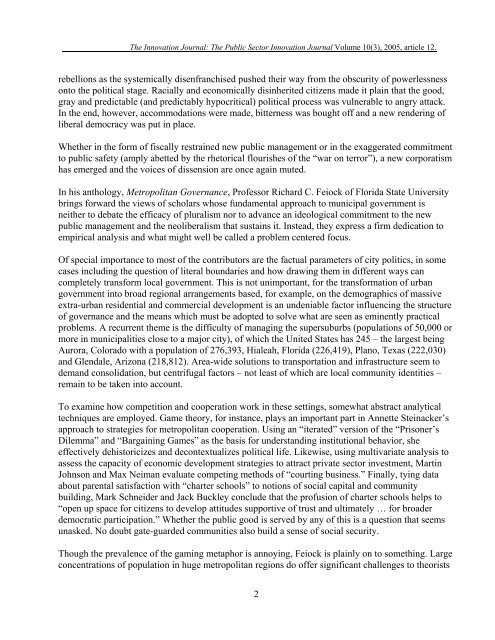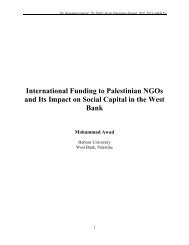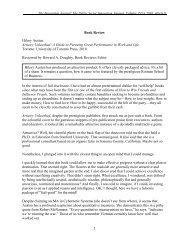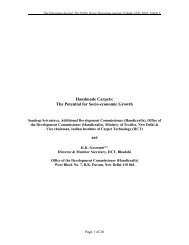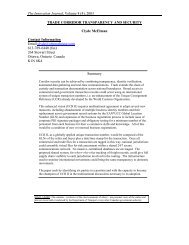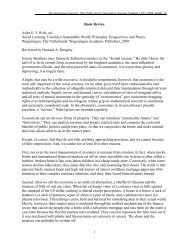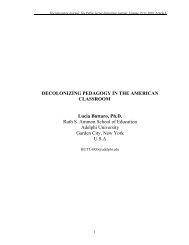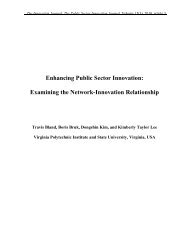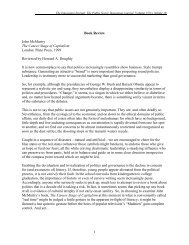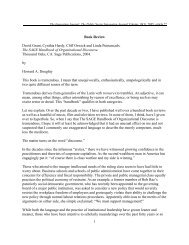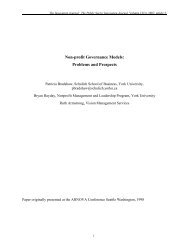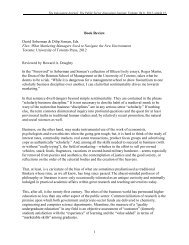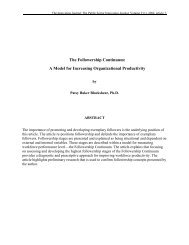Metropolitan Governance: Conflict, Competition and Cooperation
Metropolitan Governance: Conflict, Competition and Cooperation
Metropolitan Governance: Conflict, Competition and Cooperation
You also want an ePaper? Increase the reach of your titles
YUMPU automatically turns print PDFs into web optimized ePapers that Google loves.
The Innovation Journal: The Public Sector Innovation Journal Volume 10(3), 2005, article 12.<br />
rebellions as the systemically disenfranchised pushed their way from the obscurity of powerlessness<br />
onto the political stage. Racially <strong>and</strong> economically disinherited citizens made it plain that the good,<br />
gray <strong>and</strong> predictable (<strong>and</strong> predictably hypocritical) political process was vulnerable to angry attack.<br />
In the end, however, accommodations were made, bitterness was bought off <strong>and</strong> a new rendering of<br />
liberal democracy was put in place.<br />
Whether in the form of fiscally restrained new public management or in the exaggerated commitment<br />
to public safety (amply abetted by the rhetorical flourishes of the “war on terror”), a new corporatism<br />
has emerged <strong>and</strong> the voices of dissension are once again muted.<br />
In his anthology, <strong>Metropolitan</strong> <strong>Governance</strong>, Professor Richard C. Feiock of Florida State University<br />
brings forward the views of scholars whose fundamental approach to municipal government is<br />
neither to debate the efficacy of pluralism nor to advance an ideological commitment to the new<br />
public management <strong>and</strong> the neoliberalism that sustains it. Instead, they express a firm dedication to<br />
empirical analysis <strong>and</strong> what might well be called a problem centered focus.<br />
Of special importance to most of the contributors are the factual parameters of city politics, in some<br />
cases including the question of literal boundaries <strong>and</strong> how drawing them in different ways can<br />
completely transform local government. This is not unimportant, for the transformation of urban<br />
government into broad regional arrangements based, for example, on the demographics of massive<br />
extra-urban residential <strong>and</strong> commercial development is an undeniable factor influencing the structure<br />
of governance <strong>and</strong> the means which must be adopted to solve what are seen as eminently practical<br />
problems. A recurrent theme is the difficulty of managing the supersuburbs (populations of 50,000 or<br />
more in municipalities close to a major city), of which the United States has 245 – the largest being<br />
Aurora, Colorado with a population of 276,393, Hialeah, Florida (226,419), Plano, Texas (222,030)<br />
<strong>and</strong> Glendale, Arizona (218,812). Area-wide solutions to transportation <strong>and</strong> infrastructure seem to<br />
dem<strong>and</strong> consolidation, but centrifugal factors – not least of which are local community identities –<br />
remain to be taken into account.<br />
To examine how competition <strong>and</strong> cooperation work in these settings, somewhat abstract analytical<br />
techniques are employed. Game theory, for instance, plays an important part in Annette Steinacker’s<br />
approach to strategies for metropolitan cooperation. Using an “iterated” version of the “Prisoner’s<br />
Dilemma” <strong>and</strong> “Bargaining Games” as the basis for underst<strong>and</strong>ing institutional behavior, she<br />
effectively dehistoricizes <strong>and</strong> decontextualizes political life. Likewise, using multivariate analysis to<br />
assess the capacity of economic development strategies to attract private sector investment, Martin<br />
Johnson <strong>and</strong> Max Neiman evaluate competing methods of “courting business.” Finally, tying data<br />
about parental satisfaction with “charter schools” to notions of social capital <strong>and</strong> community<br />
building, Mark Schneider <strong>and</strong> Jack Buckley conclude that the profusion of charter schools helps to<br />
“open up space for citizens to develop attitudes supportive of trust <strong>and</strong> ultimately … for broader<br />
democratic participation.” Whether the public good is served by any of this is a question that seems<br />
unasked. No doubt gate-guarded communities also build a sense of social security.<br />
Though the prevalence of the gaming metaphor is annoying, Feiock is plainly on to something. Large<br />
concentrations of population in huge metropolitan regions do offer significant challenges to theorists<br />
2


